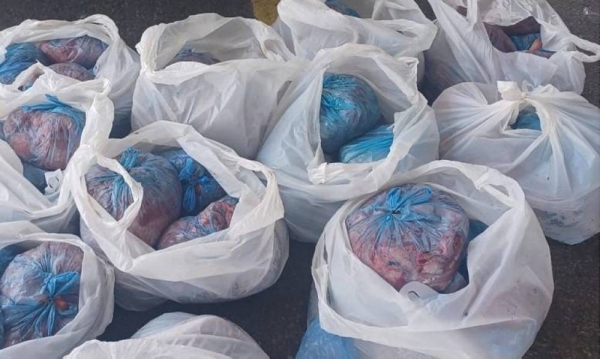During the recent Eid Al-Adha holidays, the Jeddah Governorate Mayoralty cracked down on the smuggling of rotten meat from sacrificial animals at five border checkpoints in the region. A total of 1,243 animals were found to have been slaughtered and transported illegally, without proper refrigeration, in 109 vehicles. Inspection teams from various municipalities across Jeddah worked alongside security authorities to seize and confiscate the unfit meat, ensuring that it was destroyed and not consumed by the public.
In addition to the confiscation of the rotten meat, the mayoralty also took action against illegal livestock enclosures and random slaughterhouses in the area. A total of 409 enclosures and 527 slaughterhouses were removed to prevent further illegal activities related to livestock in the region. Furthermore, nearly 1,600 vehicles were found to be selling sheep in unauthorized locations, and appropriate measures were taken to address this issue as well.
The mayoralty’s efforts to combat the smuggling of rotten sacrificial meat highlight their commitment to ensuring the safety and well-being of residents in Jeddah. By conducting thorough inspections at border checkpoints and collaborating with security authorities, they were able to prevent the consumption of unfit meat that could have posed serious health risks to the public. The swift action taken by the inspection teams demonstrates the importance of monitoring and regulating the transportation and sale of meat during religious festivals like Eid Al-Adha.
It is crucial to address the issue of illegal slaughterhouses and livestock enclosures to maintain hygiene and sanitation standards in the region. By removing these unauthorized facilities, the mayoralty is working to prevent the illegal slaughter and sale of animals, which can have negative implications for public health. These efforts also serve to uphold ethical standards in the treatment of animals and ensure that they are slaughtered in a humane and regulated manner.
The crackdown on unauthorized vehicles selling sheep in unauthorized locations further emphasizes the mayoralty’s dedication to enforcing regulations and preventing illegal activities related to the sale of livestock. By taking action against these vehicles, they are sending a clear message that such practices will not be tolerated, and measures will be in place to address any violations of the law. This proactive stance helps to maintain order and accountability in the livestock trade, safeguarding the interests of both consumers and sellers in the region.
In conclusion, the Jeddah Governorate Mayoralty’s efforts to prevent the smuggling of rotten sacrificial meat during Eid Al-Adha demonstrate their commitment to upholding health and safety standards in the region. By confiscating unfit meat, removing illegal facilities, and taking action against unauthorized vehicle sales, they are working to ensure that residents in Jeddah are protected from potential health risks and unethical practices. Through collaboration with security authorities and proactive monitoring, the mayoralty is making strides towards creating a safer and more regulated environment for the livestock trade in the region.











